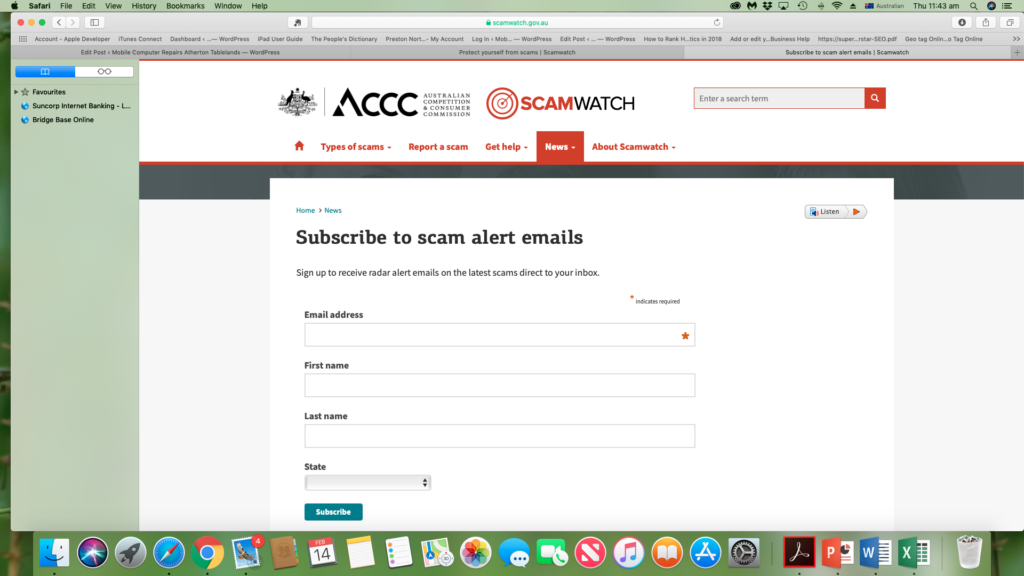Scammer threat to you
Scammer threats, unfortunately, are still around. There are many dishonest people trying to get money from you. As I told you last week Scammers are more a threat to your computer than viruses.
Avoid Online Tech Support Scams and PC Cleanup Solutions

Scammer threat to my customers
Over the past couple of years customers have called me to say that they think they may be scam victims. Generally all the scams start with a phone call. Be very careful if you receive a phone call from an unknown person or business. Sometimes it is a person calling or sometimes an automated voice message. Unfortunately, these people want to access your computer and or your finances. As you would expect, there are different ways they try to access your computer:
Offer to help make your computer run faster
Sometimes the caller says they can help speed up your computer or can generally help you with computer problems. Helpfully, they may offer to do this remotely by gaining access to your computer. Fortunately, they can only do this if you allow it! DO NOT!

Once they have gained access they can introduce software that can take over your machine. As a result the Scammers may find out passwords and credit card information. They may just take money from you. Additionally they could ask for money to not destroy your files.
Request for your credit card information
Occasionally the callers may offer to help you but ask for your credit card so they can set up an account. Once they have this they can take money from you.

Callers pretending to be from Telstra or your Internet Service Provider
Quite often my customers have received a phone call from someone who says they are Telstra and say they want to help with your internet. My mum has had several of these calls. These calls are with the intention of getting your internet business and getting you to change to them from your provider or to access your computer.
Current scam in Herberton area
Recently three customers contacted me to say they had received phone calls saying they were about to be cut off from the Internet. The caller said to avoid this they should change their service provider as NBN was about to be introduced in the area. This is not true.
Callers saying you are about to lose the Internet
Last month my mum got a phone call which was an automated voice message. It said her Internet Service Provider had been trying to contact her without success. It was urgent as she was about to lose the internet. Her internet address had “been compromised” in several overseas countries. She was told to connect to a phone number and the problem would be fixed.

What should you do?
The following is advice from SCAMWATCH
Be alert to the fact that scams exist.
When dealing with uninvited contacts from people or businesses, whether it’s over the phone, by mail, email, in person or on a social networking site, always consider the possibility that the approach may be a scam. Remember, if it looks too good to be true, it probably is.
Know who you’re dealing with.
If you’ve only ever met someone online or are unsure of the legitimacy of a business, take some time to do a bit more research. Do a Google image search on photos or search the internet for others who may have had dealings with them. If a message or email comes from a friend and it seems unusual or out of character for them, contact your friend directly to check that it was really them that sent it.
Do not open suspicious texts, pop-up windows or click on links or attachments in emails – delete them:
If unsure, verify the identity of the contact through an independent source such as a phone book or online search. Don’t use the contact details provided in the message sent to you.
Don’t respond to phone calls about your computer asking for remote access – hang up
This applies even if they mention a well-known company such as Telstra. Scammers will often ask you to turn on your computer to fix a problem or install a free upgrade, which is actually a virus which will give them your passwords and personal details.
Keep your personal details secure.
Put a lock on your mailbox and shred your bills and other important documents before throwing them out. Keep your passwords and pin numbers in a safe place. Be very careful about how much personal information you share on social media sites. Scammers can use your information and pictures to create a fake identity or to target you with a scam.
Keep your mobile devices and computers secure.
Always use password protection, don’t share access with others (including remotely), update security software and back up content. Protect your WiFi network with a password and avoid using public computers or WiFi hotspots to access online banking or provide personal information.
Choose your passwords carefully.
Choose passwords that would be difficult for others to guess and update them regularly. A strong password should include a mix of upper and lower case letters, numbers and symbols. Don’t use the same password for every account/profile, and don’t share your passwords with anyone.
Review your privacy and security settings on social media.
If you use social networking sites, such as Facebook, be careful who you connect with and learn how to use your privacy and security settings to ensure you stay safe. If you recognise suspicious behaviour, clicked on spam or have been scammed online, take steps to secure your account and be sure to report it.
Beware of any requests for your details or money.
Never send money or give credit card details, online account details or copies of personal documents to anyone you don’t know or trust. Don’t agree to transfer money or goods for someone else: money laundering is a criminal offence.
Be wary of unusual payment requests.
Scammers will often ask you to use an unusual payment method, including preloaded debit cards, gift cards, iTunes cards or virtual currency such as Bitcoin.
Be careful when shopping online.
Beware of offers that seem too good to be true, and always use an online shopping service that you know and trust. Think twice before using virtual currencies (like Bitcoin) – they do not have the same protections as other transaction methods, which means you can’t get your money back once you send it. Learn more about online shopping scams
How to protect yourself – visit scamwatch site for more information. There is also a very interesting blog on Internet Hoaxes that you should read at . Broadband Search. Click on the Internet Hoaxes link above.
Scammer threat is well known to the Australian Competition and Consumer Commission
The ACCC website lists nine different types of scams:
- Attempts to gain your personal information – such as passwords and financial detail
- Buying and selling – trying to influence what you buy
- Dating and romance – trying to get money from you
- Fake Charities trying to get donations
- Investments
- Jobs and employment
- Threats and extortion
- Unexpected money
- Unexpected winnings
The more you know about scams the less likely you are to get caught. A lot of people who call seem plausible – do not trust anyone you do not know who contacts you and requests access to your computer or who asks for money.
You can ask scamwatch to alert you about current scams. You will find this form on their website.


